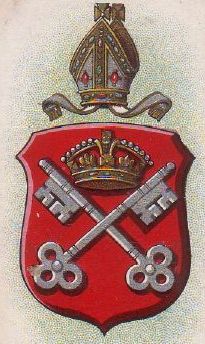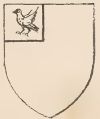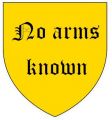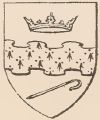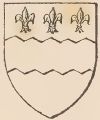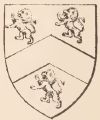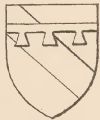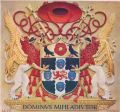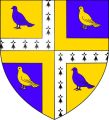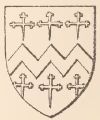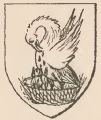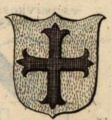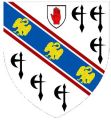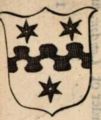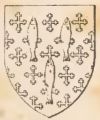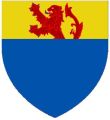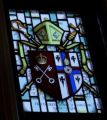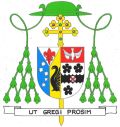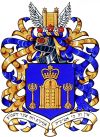Archdiocese of York
Religious or Ecclesiastical heraldry portal
This page is part of the Ecclesiastical heraldry portal |
Heraldry of the World |
|
Catholic heraldry
|
Other Christian churches Other religions
|
ARCHDIOCESE OF YORK
Country : United Kingdom
Denomination : Anglican (until 1558 Roman Catholic)
Established : 628 as Diocese of York
Elevated to Archdiocese in 735
Official blazon
Gules, two keys in saltire argent, in chief a regal crown Or.
Origin/meaning
The arms were recorded at the College of Arms.
This Coat of Arms first appears to have been used by Archbishop Robert Waldby (1397-1398). The Crown originaly more resembled the Papal Tiara, but was made into a Royal Crown after 1531. The arms thus alludes to St Peter. Anciently the Archbishop used as their official Arms a Shield identical with that of the See of Canterbury.
Arms of Roman Catholic Archbishops
Thomas (1109-1114)
Thurstan de Bayeux (1114-1140)
William FitzHerbert (1141-1147)
Henry Murdac (1147-1153)
William FitzHerbert (1153-1154)
Roger de Pont L’Évêque (1154-1181)
Geoffrey Plantagenet (1189-1212)
Walter de Gray (1216-1255)
Walter Giffard (1266-1279)
William Wickwane (1279-1285)
John Le Romain (1286-1296)
Henry Newark (1298-1299)
Thomas Corbridge (1300-1304)
William Greenfield (1306-1315)
William Melton (1317-1340)
William Zouche (1342-1352)
John of Thoresby (1353-1373)
Alexander Neville (1374-1388)
Thomas Arundel (1388-1396)
Robert Waldby (1397-1398)
Richard Lescrope (1398-1405)
Henry Bowet (1407-1423)
John Kemp (1426-1452)
William Booth (1452-1464)
George Neville (1465-1476)
Lawrence Booth (1476-1480)
Thomas Rotherham (1480-1500)
Thomas Savage (1501-1507)
Christopher Bainbridge (1508-1514)
Thomas Wolsey (1514-1530)
Edward Lee (1531-1544)
Nicholas Heath (1555-1559)
Arms of Anglican Archbishops
Robert Holgate (1545-1554)
Thomas Young (1561-1568)
Edmund Grindal (1570-1576)
Edwin Sandys (1577-1588)
John Piers (1589-1594)
Matthew Hutton (1595-1606)
Tobias Matthew (1606-1628)
George Montaigne (1628)
Samuel Harsnett (1629-1631)
Richard Neile (1632-1640)
John Williams (1641-1650)
Accepted Frewen (1660-1664)
Richard Sterne (1664-1683)
John Dolben (1683-1686)
Thomas Lamplugh (1688-1691)
John Sharp (1691-1714)
William Dawes (1714-1724)
Lancelot Blackburn (1724-1743)
Thomas Herring (1743-1747)
Matthew Hutton (1747-1757)
John Gilbert (1757-1761)
Robert Hay Drummond 1761-1776)
William Markham (1776-1807)
Edward Harcourt (1808-1847)
Thomas Musgrave (1847-1860)
- No image
Charles Thomas Longley (1860-1862)
- No image
William Thomson (1862-1890)
- No image
William Connor Magee (1891)
- No image
William Dalrymple Maclagan (1891-1908)
Cosmo Gordon Lang (1909-1928)
- No image
William Temple (1929-1942)
Cyril Forster Garbett (1942-1955)
- No image
Arthur Michael Ramsey (1956-1961)
Frederick Donald Coggan (1961-1974)
- No image
Stuart Yarworth Blanch (1975-1983)
- No image
John Stapylton Habgood (1983-1995)
David Michael Hope (1995-2005)
- Did not use arms
John Sentamu (2005-2020)
- No image
Stephen Geoffrey Cottrell (2020-present)
This page is part of the Ecclesiastical heraldry portal
|
Catholic heraldry
|
Other Christian churches |
|
This page is part of the Ecclesiastical heraldry portal
|
Catholic heraldry
|
Other Christian churches |
|
Contact and Support
Partners:
Your logo here ?
Contact us
© since 1995, Heraldry of the World, Ralf Hartemink 
Index of the site Symbolism of the Arms from Heraldry of the Chruch a Handbook by E.E. Dorling.


